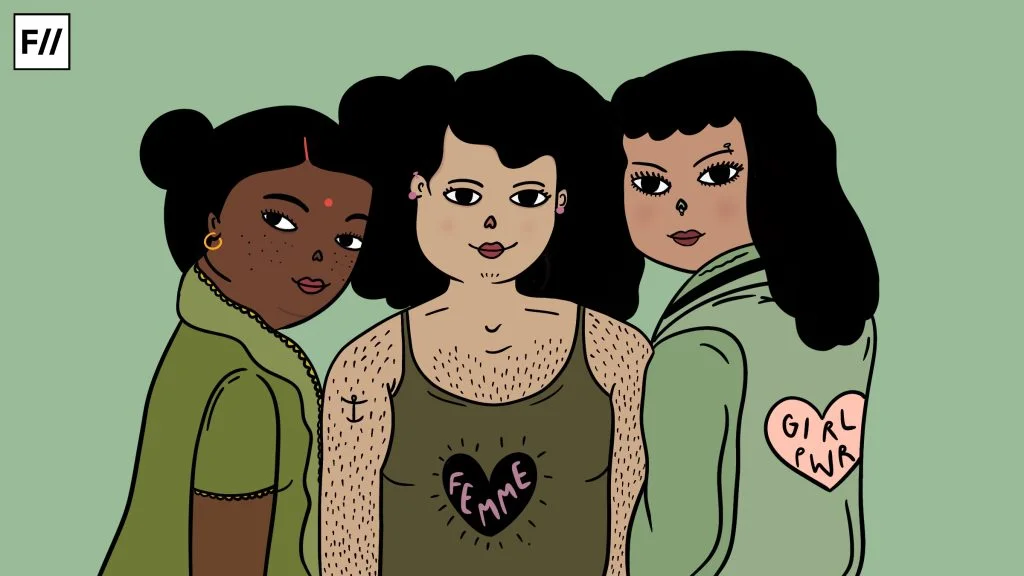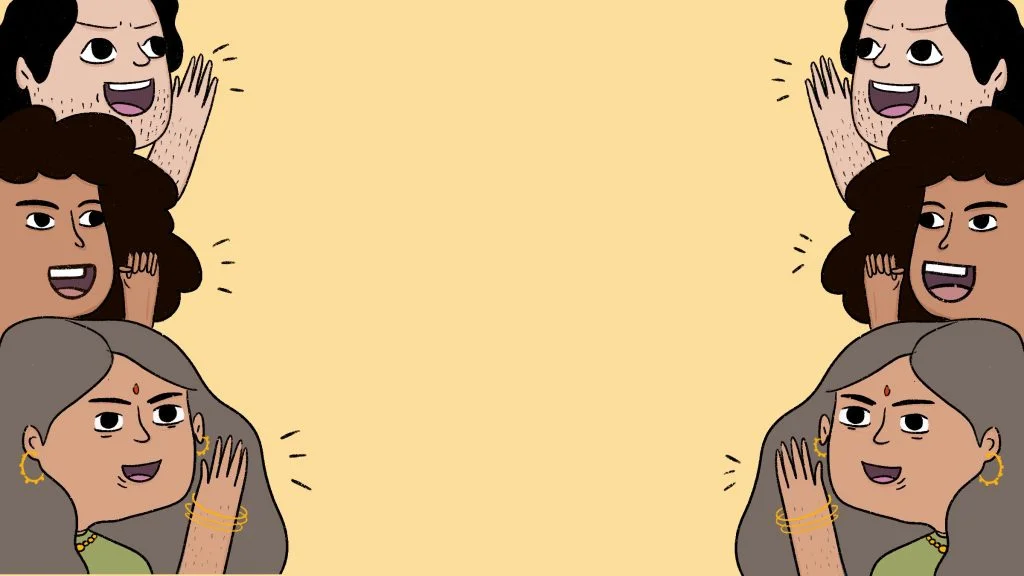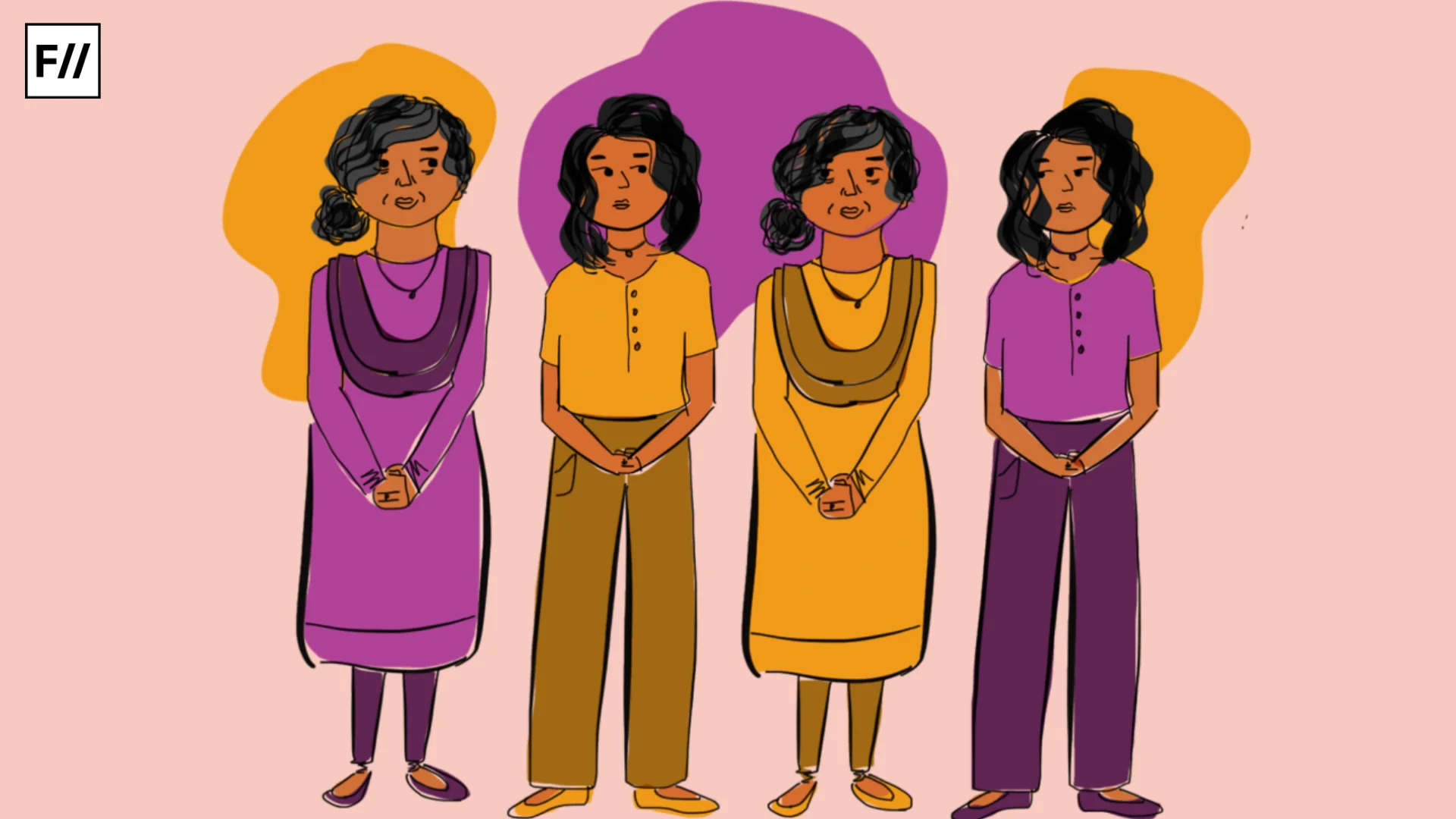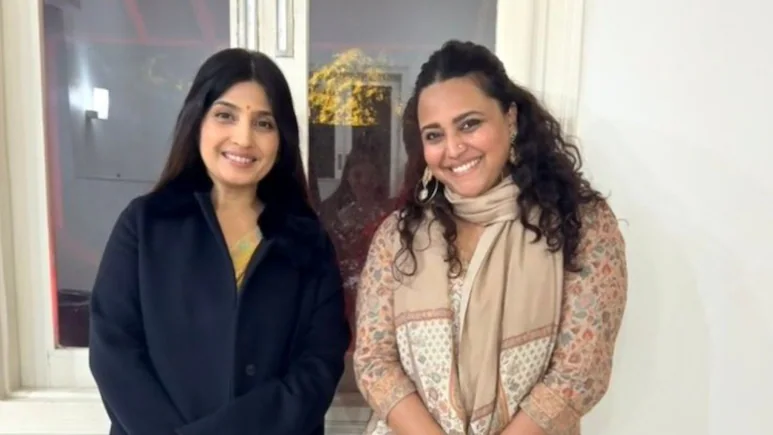Bollywood, for long, has defined the typical way in which affection is shown, limiting any space for close female friendships to spiral out of the rigid limits of structured relationships. Cinema is an effective medium in creating the morals of what is right or wrong. Our everyday views on female bonds, including their expressions of affection towards each other, are heavily controlled by these moral rules. Casual expressions of female admiration often turn into scandals or are routinely trivialised. They are categorised or stereotyped as “lesbianism” or “sisterhood”. Male friendships and symbolic gestures of love, on the other hand, are glorified and projected as superior, termed as “bro code”. Pop culture has appropriated these moralistic norms and established a framework in which affection is judged based on one’s gender.
Despite the social constraints, female bonds in our daily lives, united by a sense of survival and solidarity, succeed in transcending the limits of time and space and social barriers, but pop culture fails in recognising that. As Ava Gilder writes, “Female friendships are amongst the most enduring, intentional, and mutual relationships of our lives. They are safe spaces for us to be authentically ourselves, without fear of judgment and retaliation.” Still, the society, viewing them from a hetero male perspective, loves to stereotype these bonds.
Bollywood, female friendships, and the internet frenzy
Recently, actress Swara Bhasker became the target of netizens after her remarks that she has a “girl crush” on the Samajwadi Party MP, Dimple Yadav, went viral, fuelling debates about Swara’s sexuality. The moral police was quick to slam her for her take on “bisexuality”, opening up the space for discussion on how closely society patrols women’s affections. In the past, Alia Bhatt and Deepika Padukone, as well as Katrina and Deepika’s friendships, have similarly been labelled as a facade due to their past links with actor Ranbir Kapoor.

In another incident, when actress Rekha, speculated to have had a former affair with Amitabh, was seen embracing actress-politician Jaya Bachchan in an award show commemorating the former, the internet became the hotspot of memes flooded with viral clips of the embrace from the show. The incident was intensely scrutinised through a patriarchal lens, which saw it merely as a moment of jealousy disguised in affection.
Why are female bonds of friendship or simply affection so closely monitored, judged, sexualised, or trivialised? The answer lies in the internalised misogyny that has rooted itself in pop culture, rooting the horrendous dictum of “Aurat he Aurat ki Dushman hoti hai” (women are each other’s biggest enemies).
Casual expressions of female admiration often turn into scandals or are routinely trivialised. They are categorised or stereotyped as lesbianism or sisterhood. Male friendships and symbolic gestures of love, on the other hand, are glorified and projected as superior, termed as “bro code”.
This moral policing often turns a blind eye to the comfort and closeness that female friendships offer to women by creating a safe, judgement-free space; by holding each other up; by consoling each other when they feel invalidated by the society; by supporting them in leaving an abusive relationship; or by giving the validation to make a woman feel comfortable in her own skin. Social media, too, just acts as another arm of patriarchy, where men bring women down by “lesbianising” the act of women who give appreciative comments and bring each other up on the internet.
Michel Foucault points out that “friendship is an important social formation, as it signifies the possibility of functioning outside normative discourses that are not easily possible within other relationships such as marriage or nuclear family.” Women have often been portrayed as incapable of forming homosocial bonds as strong as men. Nonetheless, female friendships are intersubjective spaces that become viable sites of resistance. In female bonds and expressions of affection lies strength, and they are, more often than not, a meditative space for reflection, healing, growth, and comfort, visibly manifested at the micro-level.

When the 2019 Filmfare Awards showed Ranbir and Vicky sharing a passionate kiss, the internet was quick to label it as “bromance”, seeing it as a playful gesture of uncontained happiness. Whereas female friendships in films like Veerey Di Wedding and Yeh Jawaani Hai Deewani faced criticism and cultural disapproval for their unflinching honesty and boldness, ignoring their sincere portrayal of affection. Feminine affirmation is an expression of an alliance that patriarchy finds threatening.
From a theoretical lens—Adrienne and Mulvey’s arguments
Swara Bhasker’s remarks on Dimple Yadav were coupled with a conversation-stirring debate on “how there is a tendency for society to force heterosexuality on us when we are all naturally born bisexual”. The statement generated intense social fury, leading to a widespread debate on the internet; it can be found rooted in Adrienne Rich’s theory on “compulsory heterosexuality”. The theory attempts to explain how society functions in a manner that tends to distort the experiences of heterosexual women, leading to a complete erasure of lesbian existence. Women are thus viewed as emotional and sexual property of men, controlled by institutions such as patriarchal motherhood, family, and economic exploitation, strengthened by religious fiat, legislation, and media imagery.
The comfort and closeness that female friendships offer to women by creating a safe, judgement-free space; by holding each other up; by consoling each other when they feel invalidated by the society; by supporting them in leaving an abusive relationship; or by giving the validation to make a woman feel comfortable in her own skin.
Similarly, Laura Mulvey’s influential 1975 essay ‘Visual Pleasure and Narrative Cinema’ further draws on sexual objectification in visual media such as advertisements and films, controlled from a predominantly heterosexual male lens. The theory explains how women are seen as passive objects of desire by the mainstream media. The gaze very often involves the camera positioning the viewer as a male observer, perpetuating gender stereotypes while reinforcing power imbalances between men and women. These theories, thus, serve as the foundation for understanding the semiotics behind the mockery of women’s expressions of affection, explaining why they are so closely policed.
Femininity, pop culture, and belonging
There can be a deep insight into a woman’s compliments and her affective gestures. Tied to the idea of reclamation and joy, female friendships hold immense transformative power and are radical bonds of love. Think of the strong bonds of self-identity that are created when two women belonging to a common neighbourhood gather to discuss their daily lives. Add to it the collective male discomfort at seeing a female gathering of such a magnitude, and the discomfited whispers passed around that morally judge women’s expressions and attitudes, stifling their commonalities.

Doesn’t Koffee With Karan often turn from being a site of celebrity banter to a judgmental space pitting women against one another by riddling their affection in the disguise of envy? The pop culture of contemporary times needs a wake-up call. Female praise and admiration for one another isn’t merely fodder for the constantly churning gossip mills that can be easily trivialised or sexualised. The elusiveness of female friendships lies in their mutability and ability to overlap with other kinds of relationships, along with the socio-cultural structures in which they are situated.
All these incidents reveal a common undertone—the media’s and the audience’s power in shaping perceptions and moral attitudes. It can either uplift women or deflate a moment by hanging it onto prejudices. Rather than sensationalising or mislabelling in caricatures, the media can present a more sensitive and realistic picture. Womanhood is a layered and beautiful journey, allowing other women to be themselves by cheerleading them or lifting them, and this culture of raised eyebrows needs to be stopped immediately. For all its steam and froth, Bollywood’s favourite brew still has a bitter aftertaste: when it comes to womanhood, the Koffee is served cold.
About the author(s)
Nausheen is currently an undergraduate student pursuing journalism at Lady Shri Ram College for Women, Delhi University. With a keen interest in feminism, geopolitics, and social issues, her passions lie in research, writing, and public speaking. In her free time, she enjoys listening to music, sipping coffee, and playing chess.





